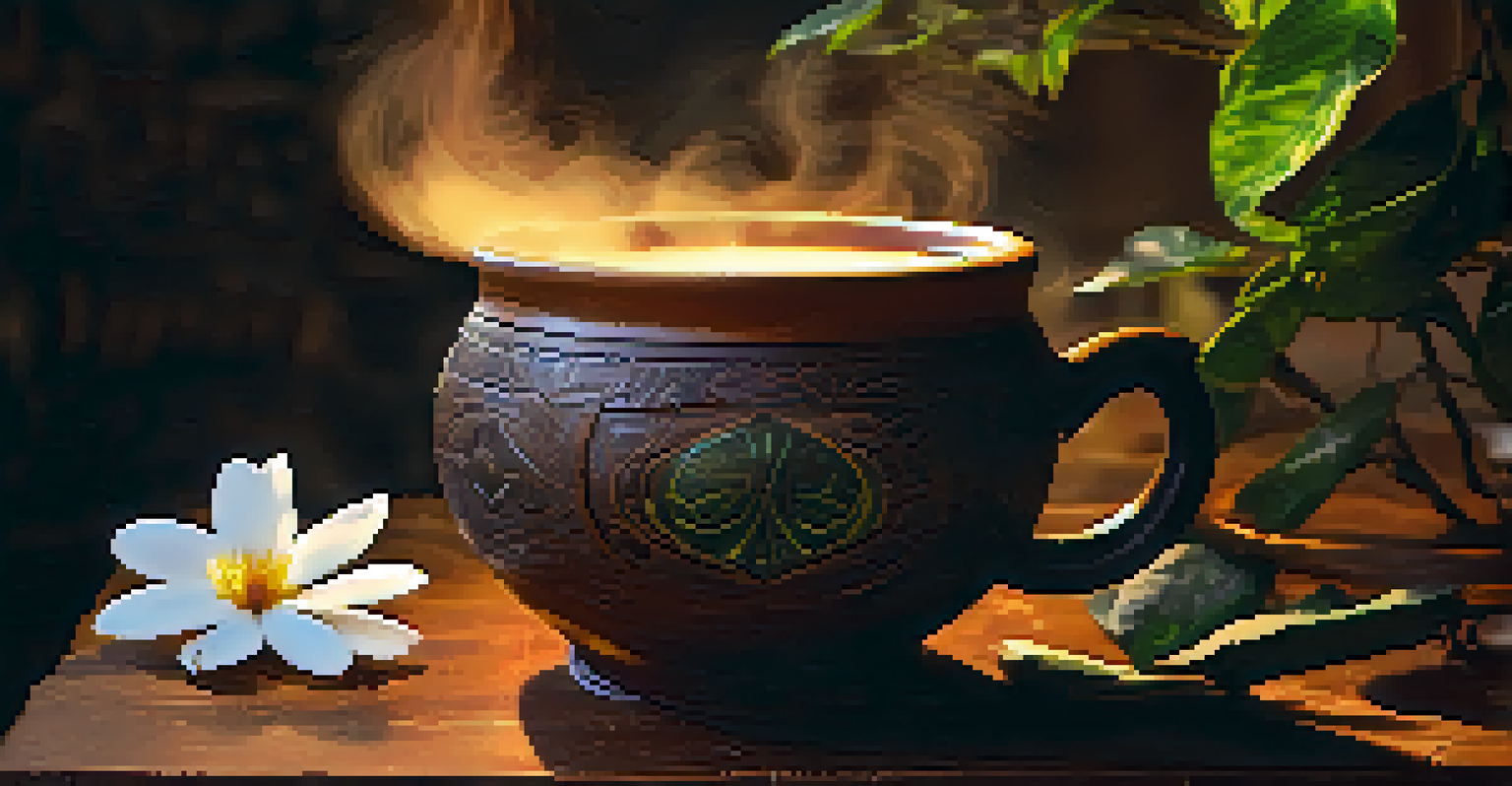Ayahuasca Rituals Across Cultures: A Comparative Study

Understanding Ayahuasca: A Brief Overview
Ayahuasca is a powerful psychedelic brew made from the Banisteriopsis caapi vine and other plants, known for its profound psychoactive effects. Traditionally used in spiritual ceremonies, it facilitates deep introspection and healing. The journey often leads participants to confront personal issues, gain insights, and connect with a higher consciousness.
The use of Ayahuasca as a healing tool is rooted deeply in the cultural practices of indigenous tribes, where it is viewed as a sacred teacher rather than just a substance.
This ceremonial drink has roots primarily in the Amazon rainforest, where indigenous tribes have used it for centuries. The rituals surrounding Ayahuasca are rich in cultural significance and vary widely among different communities. As interest in Ayahuasca grows globally, understanding its cultural contexts becomes increasingly important.
In essence, Ayahuasca serves as a bridge between the physical and spiritual realms, allowing individuals to navigate their inner landscapes. By examining the various rituals associated with this brew, we can appreciate its diverse meanings and applications across cultures.
The Role of Indigenous Tribes in Ayahuasca Use
Indigenous tribes in the Amazon are the original custodians of Ayahuasca traditions, using it for centuries in healing and spiritual practices. For these communities, Ayahuasca is not just a substance; it’s a sacred teacher that imparts lessons through visions and experiences. The shamans, or spiritual leaders, are crucial in guiding participants through their journeys.

The rituals often involve singing icaros, traditional songs believed to enhance the experience and protect participants. These ceremonies are communal, fostering a sense of connection among participants and with the earth. This cultural aspect emphasizes the importance of community in healing and spiritual growth.
Ayahuasca's Cultural Significance
Ayahuasca serves as a sacred bridge between physical and spiritual realms, deeply rooted in indigenous traditions.
With the increasing popularity of Ayahuasca in Western settings, there's a risk of cultural appropriation. It’s essential to honor and respect the traditions of these indigenous tribes while understanding the deeper significance of their rituals.
Contemporary Ayahuasca Retreats: A New Phenomenon
In recent years, Ayahuasca retreats have emerged globally, attracting individuals seeking healing and self-discovery. These retreats often draw inspiration from indigenous practices but may differ significantly in execution and intent. While they provide a space for personal growth, the commercialization of Ayahuasca raises ethical questions.
To engage with Ayahuasca is to enter a realm where personal healing intersects with collective consciousness, emphasizing both individual and communal aspects of spiritual growth.
Many retreats emphasize safety and comfort, offering a more tailored experience compared to traditional ceremonies. However, this can sometimes dilute the cultural significance and spiritual depth associated with indigenous practices. Participants might miss out on the communal aspects that are vital to traditional rituals.
As the popularity of these retreats grows, it becomes essential to strike a balance between accessibility and respect for cultural origins. Participants are encouraged to educate themselves about the cultural context and seek authentic experiences that honor the indigenous roots of Ayahuasca.
Ayahuasca in Western Spirituality: A Growing Trend
In the West, Ayahuasca has gained traction as a tool for spiritual exploration and personal transformation. Many Western seekers are drawn to its potential for profound emotional healing and insights into life’s purpose. This trend reflects a broader interest in alternative healing practices and spiritual awakening.
However, the Western approach often focuses on individualism, contrasting with the communal aspects of indigenous ceremonies. This shift can lead to a misunderstanding of Ayahuasca's true purpose, which is often about collective healing and connection. The personal journey can sometimes overshadow the broader communal and ecological messages.
Risks of Contemporary Retreats
The rise of Ayahuasca retreats poses risks of cultural appropriation and potential psychological harm if not approached mindfully.
As Western spirituality intersects with indigenous traditions, it’s important to navigate this space mindfully. Respecting the roots of Ayahuasca and understanding its role within different cultural frameworks can enrich the personal experiences of those who partake.
The Science Behind Ayahuasca: What Research Shows
Recent scientific studies have begun to explore the effects of Ayahuasca on mental health and well-being. Research indicates that the brew can help alleviate symptoms of depression, anxiety, and PTSD, providing a unique avenue for therapeutic intervention. These findings have sparked interest from the medical community in the potential benefits of psychedelics.
One fascinating aspect of Ayahuasca is its impact on neuroplasticity—the brain's ability to reorganize and form new connections. This suggests that Ayahuasca could facilitate lasting changes in thought patterns and emotional responses, making it a powerful tool for healing. However, more research is needed to fully understand its long-term effects.
While the scientific community is beginning to catch up, it’s crucial to approach this research with caution. Ayahuasca is a complex substance, and its effects can vary greatly depending on individual circumstances and cultural contexts.
Challenges and Risks Associated with Ayahuasca Use
Despite its therapeutic potential, Ayahuasca is not without risks, particularly when used outside of traditional contexts. Adverse psychological reactions can occur, especially for those with pre-existing mental health conditions. It’s vital for potential participants to be aware of these risks and consider their personal health history.
Additionally, the setting in which Ayahuasca is consumed plays a crucial role in the experience. Inadequate support or unqualified facilitators can lead to unsafe environments, undermining the healing potential of the ceremony. Participants must conduct thorough research on the retreats or rituals they choose to attend.
Scientific Exploration of Ayahuasca
Recent research highlights Ayahuasca's potential therapeutic benefits for mental health, particularly in treating depression and PTSD.
Understanding these challenges is essential for anyone considering Ayahuasca. By prioritizing safety and education, individuals can navigate their journeys with greater awareness and respect for the sacred nature of the practice.
Cultural Preservation: The Future of Ayahuasca Rituals
As Ayahuasca continues to gain global popularity, the need for cultural preservation becomes increasingly urgent. Indigenous communities face challenges in maintaining their traditions amidst the rise of commercialized retreats. Protecting these practices is vital not only for cultural identity but also for the integrity of the rituals themselves.
Efforts are underway to promote ethical tourism and support indigenous rights, ensuring that the benefits of Ayahuasca do not come at the expense of its original custodians. By fostering respectful relationships between seekers and indigenous tribes, we can create a more sustainable model for Ayahuasca use. This approach honors the teachings and traditions that have been passed down for generations.

Looking ahead, the future of Ayahuasca rituals will depend on our collective commitment to cultural respect and preservation. By valuing the roots of this sacred practice, we can create a bridge between cultures that honors the past while embracing the potential for healing and growth.